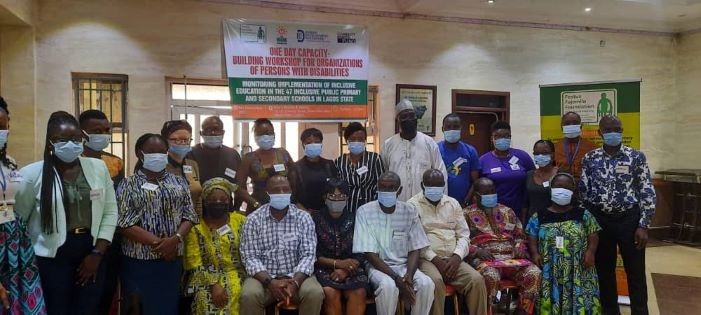Festus Fajemilo Foundation (FFF) has trained representatives of Organizations of Persons with Disabilities (OPDs) and School Based Management Committee (SBMC) on how to monitor the implementation of the inclusive education policy in Lagos State.
The one-day training is part of the activities of the United for Inclusive Education project being implemented by The Irede Foundation, FFF and Human Development Initiatives with support from Disability Rights Fund.
While giving his opening remarks at the training, Mr. Afolabi Fajemilo, the Executive Director of FFF explained that the training is being held with the aim of ensuring that the Inclusive Education policy in the state is fully implemented.
Mr Fajemilo explained that, “the monitoring exercise would help OPDs and SBMCs to identify the existing gaps between the provisions of the policy and what is currently being practiced in schools.
“With the feedback from our monitoring, we can meaningfully engage with the relevant stakeholders to ensure the necessary changes are made and children with disabilities can have access to quality and inclusive education.”
Mrs. Hilda Twins, Head, Special Education Unit, Lagos State Universal Education Board (LASUBEB) while making a presentation on the Roles of the SBMC in Strengthening Inclusive Education said the SBMC has a mission to ensure and enhance conducive learning environment for all children through effective partnership of stakeholders in school improvement programmes.
Mrs. Twins thereafter noted that it is imperative that PWDs are also members of SBMCs so they can bring to fore the necessary things to make education inclusive and accessible to all.
She tasked the Education Committee of the Lagos State Chapter of the Joint National Association of Persons with Disabilities (JONAPWD) to nominate representatives that would be incorporated into the SBMC with the aim of improving the delivery of inclusive education in the state.
Buttressing the importance of including PWDs in the constitution of SBMC, Dr. Adebukola Adebayo, Disability Inclusive Development Consultant, said that “Persons with disabilities and their families, must be recognised as partners and not merely recipients of education.
“OPDs must assume new roles within communities, schools and systems and become advisors, professional experts in specific disabilities, becoming mentors and role models to children and youth with disabilities.”
Dr. Adebayo shared that some of the proposed outcomes of the monitoring exercise are to “document and report on progress and outcomes for all stakeholders including CWDs and their parents, Teachers, School Administrators, Government, OPDs, international development partners, etc.
“Track service quality and learn from what has worked well and what has not, and identify aspects of the inclusive education policy that need to be modified or improved.”
A monitoring tool template was shared with participants at the training session, for easy use during the monitoring exercise.

